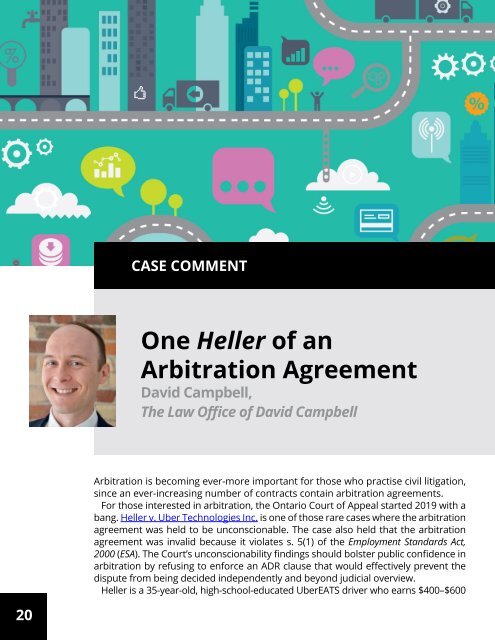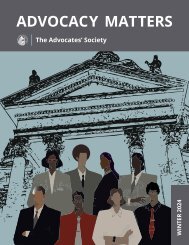Keeping Tabs February 2019
Stay up-to-date on news and events from our Young Advocates' Standing Committee (YASC) with Keeping Tabs.
Stay up-to-date on news and events from our Young Advocates' Standing Committee (YASC) with Keeping Tabs.
Create successful ePaper yourself
Turn your PDF publications into a flip-book with our unique Google optimized e-Paper software.
CASE COMMENT<br />
One Heller of an<br />
Arbitration Agreement<br />
David Campbell,<br />
The Law Office of David Campbell<br />
Arbitration is becoming ever-more important for those who practise civil litigation,<br />
since an ever-increasing number of contracts contain arbitration agreements.<br />
For those interested in arbitration, the Ontario Court of Appeal started <strong>2019</strong> with a<br />
bang. Heller v. Uber Technologies Inc. is one of those rare cases where the arbitration<br />
agreement was held to be unconscionable. The case also held that the arbitration<br />
agreement was invalid because it violates s. 5(1) of the Employment Standards Act,<br />
2000 (ESA). The Court’s unconscionability findings should bolster public confidence in<br />
arbitration by refusing to enforce an ADR clause that would effectively prevent the<br />
dispute from being decided independently and beyond judicial overview.<br />
Heller is a 35-year-old, high-school-educated UberEATS driver who earns $400–$600<br />
a week—or $20,800–$31,200 a year—working<br />
40–50 hours a week. This income is before<br />
taxes and expenses, like his vehicle.<br />
He commenced a proposed class action on<br />
behalf of all Uber drivers seeking a declaration<br />
that they are employees under the ESA,<br />
and $400 million in damages.<br />
Uber’s contracts with their drivers have<br />
arbitration agreements. Uber moved under<br />
s. 7(1) of the Arbitration Act, 1991 and<br />
Article 8(1) of the International Arbitration<br />
Act, 2017 (ICAA) to stay Heller’s action.<br />
Both provisions mandate a stay, absent<br />
certain exceptions. The Court of Appeal’s<br />
analysis focuses on s. 7(2)(2.): “The arbitration<br />
agreement is invalid.”<br />
At the heart of this case is Uber’s ADR<br />
system. If a driver has dispute with Uber,<br />
then there are several steps:<br />
• The driver starts by calling an Uber<br />
CSR in the Philippines;<br />
• The dispute may then be referred to<br />
an Uber CSR in Chicago;<br />
• Uber’s legal team may then take over<br />
the dispute from the Chicago CSR;<br />
• The driver may also go to an Uber<br />
Greenlight Hub in Ontario to ask Uber<br />
staff for help;<br />
• If still dissatisfied, the driver may commence<br />
a mediation with the International<br />
Chamber of Commerce (ICC) in<br />
the Netherlands under Dutch law; and<br />
• If the mediation fails, the driver may then<br />
commence an ICC arbitration, again in<br />
the Netherlands under Dutch law.<br />
Aside from travel and counsel fees, the<br />
driver would have to pay $14,500 (USD) in<br />
ICC filing fees to reach arbitration, along<br />
with his or her share of the mediator’s<br />
and arbitrator’s fees.<br />
The Court found that this arbitration<br />
agreement was unconscionable, because<br />
“it operates to defeat the very claims it purports<br />
to resolve.” The Court held that the<br />
facts were sufficient to meet both the twopart<br />
test for unconscionability and the fourpart<br />
test. A driver with a claim of a few hundred<br />
dollars must fly to the Netherlands to<br />
have his or her claim decided independently,<br />
rather than by Uber employees.<br />
In a separate holding, the Court also held<br />
that the arbitration agreement violates s.<br />
5(1) of the ESA and is thus unenforceable.<br />
Section 5(1) of the ESA voids provisions that<br />
force an employee to contract out or waive<br />
an employment standard. Not only does<br />
Uber’s arbitration agreement extinguish<br />
an employee’s right under s. 96 to report a<br />
dispute to the Ministry of Labour and have<br />
an Employment Services Office investigate,<br />
but it also eliminates an employee’s s. 98<br />
right to commence a civil action. According<br />
to the Court, arbitration does not fall within<br />
the definition of a civil action.<br />
However, the ESA analysis has a tricky<br />
component. It presumes that Heller’s allegation<br />
that he is an employee is capable<br />
of proof. This presumption is based<br />
on the Supreme Court of Canada’s decision<br />
in Seidel v. TELUS Communications Inc.<br />
Although Seidel certainly makes the same<br />
presumption, this is the first case following<br />
Seidel that uses the presumption in<br />
the context of a stay motion. It does seem<br />
to leave open the possibility that future<br />
plaintiffs could make questionable allegations<br />
to defeat s. 7(1).<br />
Generally, arbitration agreements<br />
must be enforced, even in contracts of<br />
adhesion, unless one of the exceptions<br />
in s. 7(2) or Article 8(1) is met, the dispute<br />
is outside the scope of the arbitration<br />
agreement, or there is a legislative<br />
override to the arbitration. In promoting<br />
arbitration as an alternative, we must<br />
not allow ourselves to enforce unconscionable<br />
arbitration agreements that<br />
may undermine public confidence in arbitration<br />
as a fair and legitimate form of<br />
dispute resolution.<br />
20 21


















